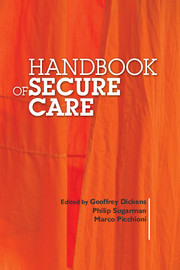Book contents
- Frontmatter
- Contents
- List of tables, boxes and figures
- List of contributors
- Preface
- 1 The evolution of secure and forensic mental healthcare
- 2 Mental disorder and offending
- 3 Clinical risk assessment in secure care
- 4 Risk management in secure care
- 5 Recovery in secure environments
- 6 Personality disorder
- 7 Women's mental health, aggression and offending
- 8 Offenders with intellectual disability in secure services and the criminal justice system
- 9 Secure mental healthcare for young people
- 10 Secure care for people with autism spectrum disorder
- 11 Acquired brain injury, trauma and aggression
- 12 Managing aggression and violence in older people
- 13 Firesetting in secure settings: theory, treatment and management
- 14 Specialist psychological treatment programmes in secure mental healthcare
- 15 Nursing in secure mental healthcare settings
- 16 Prescribing for specialist populations
- 17 Human rights in secure psychiatric care
- 18 Quality assurance and clinical audit in secure psychiatric care
- 19 Psychological support following violent assault and trauma: what works for staff in secure settings?
- Index
2 - Mental disorder and offending
Published online by Cambridge University Press: 02 January 2018
- Frontmatter
- Contents
- List of tables, boxes and figures
- List of contributors
- Preface
- 1 The evolution of secure and forensic mental healthcare
- 2 Mental disorder and offending
- 3 Clinical risk assessment in secure care
- 4 Risk management in secure care
- 5 Recovery in secure environments
- 6 Personality disorder
- 7 Women's mental health, aggression and offending
- 8 Offenders with intellectual disability in secure services and the criminal justice system
- 9 Secure mental healthcare for young people
- 10 Secure care for people with autism spectrum disorder
- 11 Acquired brain injury, trauma and aggression
- 12 Managing aggression and violence in older people
- 13 Firesetting in secure settings: theory, treatment and management
- 14 Specialist psychological treatment programmes in secure mental healthcare
- 15 Nursing in secure mental healthcare settings
- 16 Prescribing for specialist populations
- 17 Human rights in secure psychiatric care
- 18 Quality assurance and clinical audit in secure psychiatric care
- 19 Psychological support following violent assault and trauma: what works for staff in secure settings?
- Index
Summary
Introduction
In the UK patients with mental illness who are convicted of criminal offences are termed mentally disordered offenders (MDOs). While the putative link between mental illness and violent offending attracts the attention of the media, politicians and clinicians (Mullen et al, 2000), its roots remain relatively poorly understood. The public perception of the link is undoubtedly influenced by media coverage of rare acts of serious violence committed by MDOs. In fact, while a robust body of research about MDOs, which is reviewed in this chapter, supports a link between mental illness and violent offending, the absolute risk is small and is accounted for by a very small number of patients (Walsh & Fahy, 2002). Despite the public's concerns, random acts of violence against strangers are vanishingly rare; indeed, those with mental health problems are more likely to be violent to relatives at home (Danielson et al, 1998), and are even more likely to be victims of violence, homelessness and financial disadvantage than perpetrators (Walsh et al, 2003).
Psychosis and violent offending
For many years, schizophrenia was considered not to be associated with an increased risk of violence. That notion has now been reliably rejected in the light of robust evidence of an association with violent offending (Eronen et al, 1996; Tiihonen et al, 1997). Notably, Wallace et al (1998) found that more than 7% in a UK sample of men convicted of homicide had previously received treatment for schizophrenia. Despite this statistical association between psychosis and violence, the nature and cause of the link remain contentious. Some authorities suggest a direct link, highlighting specific symptoms, including the feeling of being ‘gravely threatened by someone who intends to cause harm’ (Link & Stueve, 1994: p. 143) and of an override of self-control through external forces, termed collectively threat-control override (TCO) symptoms, as predictors and drivers of violence in psychosis. The TCO theory proposed that, acting on these symptoms, individuals take matters into their own hands in what is, in effect, a pre-emptive violent strike. The hypothesis has been supported by a modest amount of data; for example, Swanson et al (1996) found that psychotic patients with TCO symptoms were twice as likely to be violent as those without.
- Type
- Chapter
- Information
- Handbook of Secure Care , pp. 15 - 26Publisher: Royal College of PsychiatristsPrint publication year: 2015



